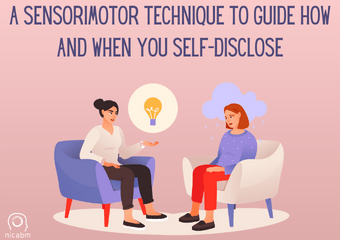In the aftermath of trauma, getting to the heart of your client’s pain can be complex – especially when that client is caught in a defense response pattern that trauma researchers often identify as please and appease. For many clients, chronic people-pleasing bleeds into every relationship. . . . . . and when that includes […]
Four Key Components of Confronting a Narcissistic Personality – with Ellyn Bader, PhD
When it comes to confronting a client’s pattern of narcissism or grandiosity, it’s safe to say you might meet with some pushback along the way. So to up your chances of success (and also mitigate the risk of damage to the therapeutic relationship), it can be helpful to pad your treatment plan with a few […]
A Sensorimotor Technique to Guide How and When You Self-Disclose
When it comes to self-disclosure in our clinical work, it can be critical to weigh very carefully just how and when we use it . . . . . . especially in cases where a client relays an experience that bumps up against a painful or overwhelming experience, we may have had ourselves. But according […]
Strategies to Help Clients Who Feel “Never Good Enough” – with Steven Hayes, PhD
Ever notice how some of your most highly skilled, successful clients often find themselves burnt out and unsatisfied?That no matter how much they achieve, feelings of inadequacy leave them believing that they’re just “never good enough”? To help them move out of this belief, one critical first step can be getting them to identify what’s […]
Marsha Linehan, PhD shares 2 Strategies for Disarming a Client’s Anger
When clients struggle to control their anger, it can alienate their family, friends, co-workers, and perhaps even you, as the clinician. So how do you get your client to recognize that their anger is an issue . . . . . . without making them angry at you (and stalling therapeutic progress even further)? In […]




